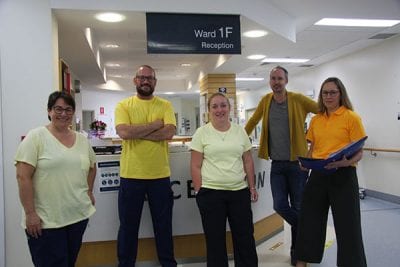Delirium awareness key to early diagnosis
Staff at The Prince Charles Hospital (TPCH) will wear yellow on 17 March for World Delirium Day, to raise awareness about one of the most under-diagnosed and misunderstood cognitive conditions worldwide.

Shining the light on delirium. TPCH staff are wearing yellow to help raise awareness about delirium which can affect as many as 1 in 5 older patients during the hospital stay.
Delirium is an acute but fluctuating disturbance in brain function and can affect as many as one in five older patients during their hospital stay, where it is often mistaken for dementia.
TPCH Geriatrician Dr Eamonn Eeles said widely variable symptoms could range from confusion, speech impairment and disorientation, right through to severe hallucinogenic states, where delusions and paranoia can spark agitation or aggression.
“Delirium can come on rapidly, often due to a combination of factors like changes in medication, inflammation, infection, changes in metabolic balance, sustained sleep deprivation, emotional distress, or even alcohol withdrawal,” Dr Eeles said.
“While it can be upsetting for family members to see a loved one behaving so out of character, it’s incredibly dangerous for the patients themselves, as they try desperately to protect themselves from fearful but imagined danger,” he said.
Traditionally, it’s been challenging for clinicians to diagnose delirium but understanding its causes is even more difficult. And while some patients can go on to make a full recovery, many don’t. Those who have undiagnosed delirium and untreated cause fare the worst.
“Delirium can be the catalyst for a cascade of events that can lead to an increased risk of dementia, so it’s crucial staff can recognise the signs and diagnose it quickly, before it takes hold,” Dr Eeles said.
TPCH has developed a range of unique tools and education programs to help staff manage and support patients who are affected by delirium during their hospital stay.
Clinicians now have access to an evidence-based app that can assist in understanding the possible causes of a patient’s delirium. The eight-step approach requires the treating doctor to submit answers to questions regarding the patient’s clinical status, looking at clinical findings together with investigations and putting together a sensible list of causes.
Once submitted, answers are assessed and analysed using the app’s pre-determined algorithm to present possible causes of the delirium, as well as other areas for further investigation.
TPCH staff have also introduced a standardised delirium screening tool and a delirium assessment and management plan in combination with educational programs to give staff the knowledge of how to identify whether a patient may be affected by delirium, early in the care process.
“Early diagnosis is the key to preventing longer hospital stays, poorer clinical outcomes and greater overall costs to the healthcare system, so it is essential that staff know what to look for and what they can do about it,” Dr Eeles said.
